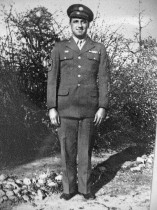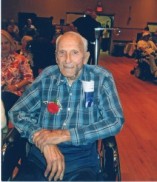“Prisoners of War,” Herbert Pepper (WWII-030)
By Steven Houston
 Listen: Oral history interview clip at UFDC with Herbert Pepper 07:57
Listen: Oral history interview clip at UFDC with Herbert Pepper 07:57
Herbert Pepper was an Air Force sergeant who served in the Pacific theater during World War II. Pepper underwent severe trauma as he survived the brutal prisoner of war experience in the Philippines and Japan; a determined and ardent survivor, he endured great suffering at the hands of Japanese soldiers for over three years.
 Pepper dropped out of high school and joined the Air Force in May of 1941. Pepper’s station in the Philippines was bombarded at the same time the Japanese attacked Pearl Harbor. The Japanese attack devastated Pepper’s unit, and the Americans surrendered; the ensuing POW march became known as the Bataan Death March.
Pepper dropped out of high school and joined the Air Force in May of 1941. Pepper’s station in the Philippines was bombarded at the same time the Japanese attacked Pearl Harbor. The Japanese attack devastated Pepper’s unit, and the Americans surrendered; the ensuing POW march became known as the Bataan Death March.
Pepper’s and his comrades were beaten and starved, and many were shot and killed Pepper states during his interview that “If you fell out of line, that’s where you stayed.” As the four day, sixty-five mile march wore on and more Americans collapsed, Pepper’s determination and desire to get back home sustained him despite struggles with dysentery and beriberi. He and his surviving comrades were put into work camps with high mortality rates, no medical care, and little food. Captives were put into groups of ten, with the threat that if one escaped, the other nine members of his group would be executed. Despite his struggles, Peppers remained resilient and rebellious, determined not to aid the enemy in any way.
[Pepper] was once cruelly beaten in a coal mine for working deliberately slow, telling his guards that for “every time [I] pull a shovel of coal out,” that keeps Uncle Sam away that much longer.
Pepper also attempted to sabotage a Japanese jackhammer by pouring sand into it and was cruelly beaten.
During his imprisonment in the Philippines and Japanese work camps, Pepper lived in extremely harsh conditions. He was worked rigorously, slept on a bed of bamboo on the ground, and received a bowl of rice a day for meals. There was no news of the war effort available inside the camp. Transportation between camps was also grim; upwards of 500 people were crammed into a boat travelling between camps in Japan and the Philippines; there were no bathrooms, water, food, or fresh air for the seven day trip. Conditions in the camp were so horrific that some of Pepper’s comrades would break their bones to get out of working.
The moment of Herbert Pepper’s liberation was both triumphant and tragic. Pepper, stricken with illness and weakened by beatings, could not leave with the liberating party when they first arrived. His departure was delayed several days before he was placed on a train leaving the camp. The camp had been near enough to Nagasaki for Pepper to feel the shock and tremors of the atomic bomb in the mine shaft he worked in when his train departed the camp to take him home, he witnessed firsthand the utter devastation wreaked on the city. Pepper was thankful for the atomic bombing, as the prisoners had an execution date planned if the US had chosen to invade. Pepper was taken to a New Mexico hospital for four months, as he had unknowingly contracted TB in the mines. He spent another thirteen months in a North Carolina hospital to address the significant health problems he endured in captivity. The starvation rations, vicious beatings, and constant backbreaking work left Pepper’s 175 pound frame whittled down to a mere 125 pounds when he finally returned home.
 Despite this long period of suffering, Pepper said he had no regrets about his service. He spent his back and sick pay on a car, got married, and had a family. During his interview, Pepper admitted that he still suffered significant health issues caused by his imprisonment; he had recurring pain from the beriberi as well as atherosclerotic heart disease, arthritis, and anxiety that he attributes to working in the mines.
Despite this long period of suffering, Pepper said he had no regrets about his service. He spent his back and sick pay on a car, got married, and had a family. During his interview, Pepper admitted that he still suffered significant health issues caused by his imprisonment; he had recurring pain from the beriberi as well as atherosclerotic heart disease, arthritis, and anxiety that he attributes to working in the mines.
Pepper attributes his survival to his powerful determination to return home and have real food again. While Pepper was an exceptional survivor, the POW experience and particularly the Bataan Death March took many of Pepper’s comrades, and the few survivors were shaken to their core. The Japanese POW camps had a mortality rate of nearly 40% (compared to the 1% rate in Germany). Very few prisoners returned home, and like Pepper, even fewer returned home without permanent damage.
Photos donated by Herbert Pepper to the Samuel Proctor Oral History Program. For additional information about these and other histories, contact SPOHP, call the offices at (352) 392-7168, and connect with us online today.